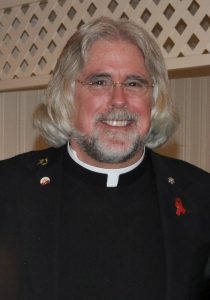Plain Talk: Exploring restorative justice
By Fr. Francis Pizzarelli

On the first Sunday in June myself and a colleague left JFK Airport with 10 university students for Berlin, Germany. Their ages ranged from 19 to 22 with one returning student who is 40. The purpose of this trip was a study abroad experience in restorative justice. My colleague is the chairperson of Criminal Justice at Saint Joseph University, and I participated representing our social science department as a sociologist and clinical social worker.
Our hope is that our students will come home with a better understanding of the profound differences between American criminal justice and German criminal justice. The differences are significant. American criminal justice focuses on punishment; the German system focuses on rehabilitation, transformation and change.
From the moment you walked on the ground of the two prisons we were privileged to visit, you could sense in the air that these prisons are different. The first thing they do when an inmate arrives is a complete psychosocial work up and a life plan that focuses on a positive treatment program with attainable goals.
All of the inmates have single rooms with a bathroom and a TV which they pay for. The walls are painted with bright colors; the inmates are permitted to post pictures and/or posters that are meaningful to them. There are plants throughout the building and outside within the courtyard that the inmates are allowed to utilize. In addition to plants, there are flower gardens and vegetable gardens that the inmates maintain.
They have the opportunity on campus to work in the woodshop and the metal shop. Things they make are sold in the community to support the important work of the prison. Every six months, the social therapy team convene to see how the inmate is doing. If he’s not doing well, they look at what to do to adapt and adjust his treatment plan to better empower him to make the changes he needs.
After three very intense days, I am writing this article with four more days left of our trip. Thus far the students have shared that the experience has been overwhelming; that they learn so much from visiting the two prisons. Each superintendent commented on our students’ questions and their insight. In addition to the two prisons, we’ve visited one of the first concentration camps in Berlin, the Berlin Wall, and the Holocaust memorial in the city. We were all very conscious of the innocent loss of life because of hate.
Despite the intensity of the experience, I was very impressed with these 10 students’ sense of hopefulness, especially in the positive sharing they engaged in. They conveyed in our morning conversations about their experiences and their desire to make a difference, even in the midst of our polarized world.
These students are coming home with a deeper awareness of what restorative justice is and how they can contribute to making it happen in our country. These young men and women are our future. They are amazing and give me renewed hope that tomorrow will be better.
Father Francis Pizzarelli, SMM, LCSW-R, ACSW, DCSW, is the director of Hope House Ministries in Port Jefferson.







